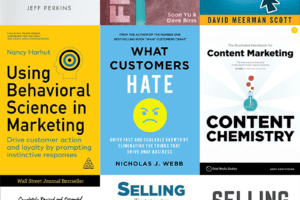???? Episode 73 of Yes, and Marketing
Dave Kellogg has done it all. He’s been the CEO of Mark Logic, a high-profile B2B SaaS company, led marketing teams at industry leaders SalesForce and Business Objects, served on countless boards, and is a highly respected advisor, director, consultant, angel investor, and blogger who focuses on enterprise software startups.
On this episode, Dave and Steve talk about strategies for aligning sales and marketing, positioning, simplicity in messaging, and hiring, in addition to thoughts on comedy, philosophy, geophysics, and the Grateful Dead.
Tap through the chapters above to listen or read on for our highlights from the interview.
???? Who is Dave Kellogg?
Name: Dave Kellogg
What he does: Advisor, director, consultant, angel investor, and blogger.
Find Dave on the web: Kellblog | LinkedIn | Twitter
Get smart: “Your job when you’re playing offense on marketing is to try and make things black and white. When you’re playing defense in marketing, it’s to try and make things gray.”
???? Top Takeaway
Simplify your messaging
“Marketing’s job is to impose simplicity, period.” Dave says. “There’s shades of gray in everything. Our job is to make stuff black and white.”
He gives a couple ways to make simplicity easier:
- Identify which of the two types of messaging you need. Do you need to differentiate your product in the market— a “Why buy mine?” message? Or do you need to grow the entire market with a “Why buy any?” message? Dave gives more on this breakdown in his blog post on The Two Archetypal Marketing Messages.
- Use rigorous definitions. If you define a feature X so that, by your definition, your product has X and the competition does not, you can use a very simple, binary message—“We’re the only ones with X.”
Be on the lookout, though, for competitors looking to turn your black-and-white message gray: When I was at Host Analytics,” Dave recounts, “we had a planning module and a consolidation module. Adaptive Insights only had a planning module. That’s black-white, right? ‘Hey, we have consolidation. They don’t.’ What they did, which was very smart, is they built a very flimsy consolidation module to turn our black-and-white message gray.”
He continues, “And it worked because all of a sudden, the conversation changed from, ‘Well, I bought Host’s because they have consolidation and Adaptive didn’t,’ to now we’re in a quagmire of debate about why our consolidation is better than their consolidation.”
???? Episode Highlights
Read verbatim excerpts from our interview with Dave Kellogg.
Long copy sells
“Most marketers think short copy, right? ‘Oh, gotta be short. People are busy and they have no attention span.’ But if you’re going to go buy all-terrain tires for your truck, or if you’re going to buy new roofing tiles for your house, or if you’re going to get a laser eye surgery procedure or whatever it is, you have time for long copy.
…If you’re selling candy bars at the checkout aisle of the supermarket for an impulse purchase, maybe this principle doesn’t apply. But if you’re selling anything that’s a medium or high consideration purchase—either because it’s got a high price tag, or the success or failure of it is key to your job—you have time.”
The problem in content marketing today?
“My basic belief is while there is a place for the C content, I think most content marketers produce lots and lots of B content, maybe B- content, and very little A content.”
…but not every piece can be an A+
“With my PR team back in the day, I’d say ‘I want this to be a C press release, it’s a tactical throw away one off, but I want this one to be an A.’ Because otherwise it’s managerial cop out. If you just tell everyone you want an A on every piece, then you’re probably going to get a B on every piece. You can feel good about yourself about being demanding, ‘I want straight A’s,’ but you’re probably actually delivering straight B’s.”
Career advice for marketers
“I’m a big believer to try and alternate between big and little companies because you learn in both environments, but you learn very different things.
…You get breadth at little companies. You get depth and maybe best practices at big ones.”
How to know if a marketing candidate from a big company can cut it at your small one
“You want somebody who’s inherently not stovepiped because the more they just lived in their little stovepipe and chucked stuff over the transom, the less well they’re gonna do in the small company because the small company really is all about breadth.
…It’s somebody who feels a little bit too hands on, and it’s somebody who in some ways is maybe too broad. Like, ‘Oh, they used to give me flack for spending so much time with demand gen guys.’ Or, ‘I got guff for spending too much time with the SEO team or too much time with the events team’… That’s the person you wanna hire.”
How to get aligned with sales
“Talk to the salespeople who don’t want to talk to you.
One of the things I learned—and this is a sad reality, but I learned it very early in my career—some of the salespeople who have the most opinions about marketing and the most time to talk about marketing are the least successful salespeople. …If you only talk to the salespeople who have time to talk to you, you are gonna get selection bias of the people who chose to talk to marketing.”
Writing is learning
“The lesser known use case [of the Kellblog] is I do it because it helps me understand a topic. So if there’s something I feel like I don’t understand, I’ll make a note to write a blog on it, because it forces you to go understand it.
I think people forget that it’s probably true of content marketing as well, where you’d say, ‘Well, gosh, I don’t know much about feature XYZ, but I think it’s important to customers.’ Go commit to write something about it and you’re going to force yourself to learn about it.”
Create rigorous definitions
“If you’re giving a training on messaging and people are objecting every five minutes going, ’It’s not so simple, it’s not so simple,’ you’ve probably done a good job because that’s what you want to hear.
You say, ‘Yeah, I know that, but I’ve covered that because I said only we do X, and I can tell you what X is. I have a rigorous definition of what X is, and by that definition only we do it.’
…I don’t want to encourage semantic hair splitting, but I do want to encourage rigorous definitions because if you have rigorous definitions, that can help you make a gray world into a black and white world.”
Write the short letter
“There’s the old line ‘Sorry I wrote you a long letter, I didn’t have time to write a short one.’ Marketing’s job is to write—particularly on core subjects like core messaging and positioning—our job is to write a short letter, not the long letter.”
Keep asking “So what?”
“If you’re ever looking for the big punchline or the big business benefit for a case study, the way you get it is just by asking ‘So what?’ so many times that you’re worried they’re gonna get angry at you.”
Don’t forget the kiss
“The example I always use in classic messaging is a feature, function, benefit, consequence messaging.
So the feature is green spots in laundry detergent—we have a laundry detergent and it has green spots. The function is they have some amazing chemical process, which makes the towels whiter.
..The advantage—which is the first order benefit—is a whiter towel. The consequence, i.e. if you don’t have the feature, what happens?—is you have a dirty towel, and then both the consequence and the advantage are stacks. So, so what about a whiter towel? Well, your spouse comes home and gives you a kiss at the end of the day.
If you look at your typical TV commercial, that’s exactly what it is, right? The slice of life commercial is green spots, pour it in, white towel comes out, spouse looks at the towel and goes ‘Yay’ and kisses the spouse, and that’s the ultimate benefit, right? So I always say in marketing, don’t forget the kiss.”
????️ Dave Kellogg Quotes
“Everything we do is an experiment and we should approach things with such humility.”
“One of my rules of thumb is that salary tends to go up 20% on levels in the hierarchy, whereas equity goes up 4x.”
“If you’re selling a high consideration product where success is critical, the price tag is high, or it makes a big impact on the career of the purchaser, they have time.”
“Your job when you’re playing offense on marketing is to try and make things black and white. When you’re playing defense in marketing, it’s to try and make things gray.”
“We’re the people whose job it is to drain the swamp of confusion.”
“There’s really only two types of messages: Why buy one? Or why buy mine?”
???? Learn More
Check out a few of Dave’s recent favorites:
Gad Elmaleh: “He’s a French comedian who was super popular in France and then moved to the US to try and break it through here. Didn’t really succeed, but he does a lot of very good kind of French American humor, French New York style humor.”
Leah Lamarr’s “Hot on the Mic” on Clubhouse: “These guys are hilarious. They do a midnight roast on Clubhouse that is very, very funny. …During the pandemic, some of the best comedy I’ve ever heard was in these rooms.”
The Three Body Problem: “I read the first one and was blown away, and just literally two minutes ago I finished the second one. Really amazing stuff.”



